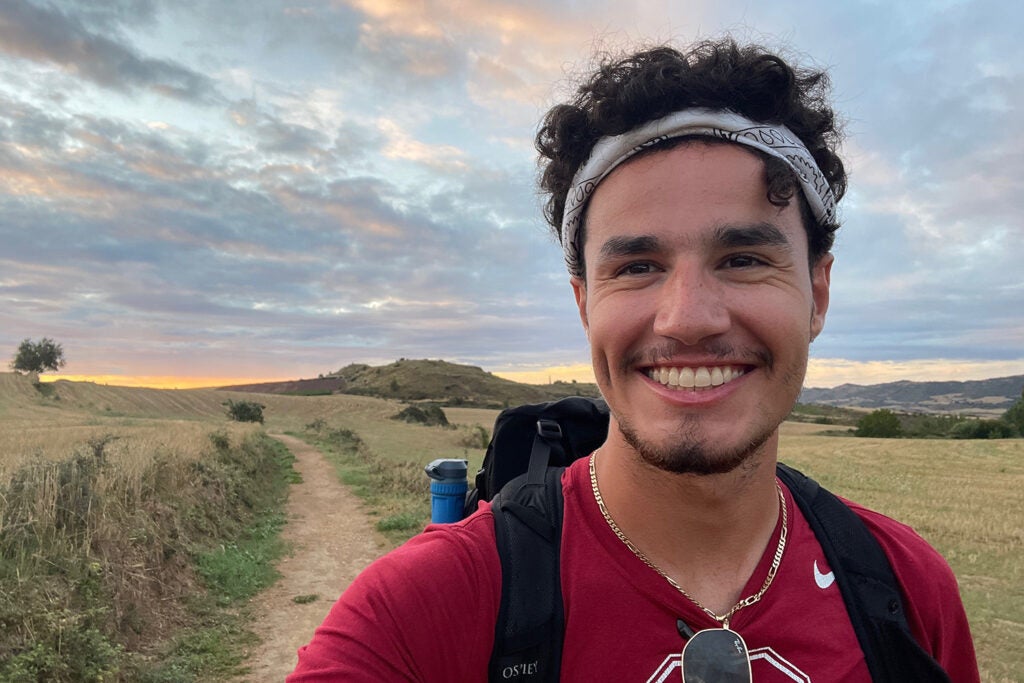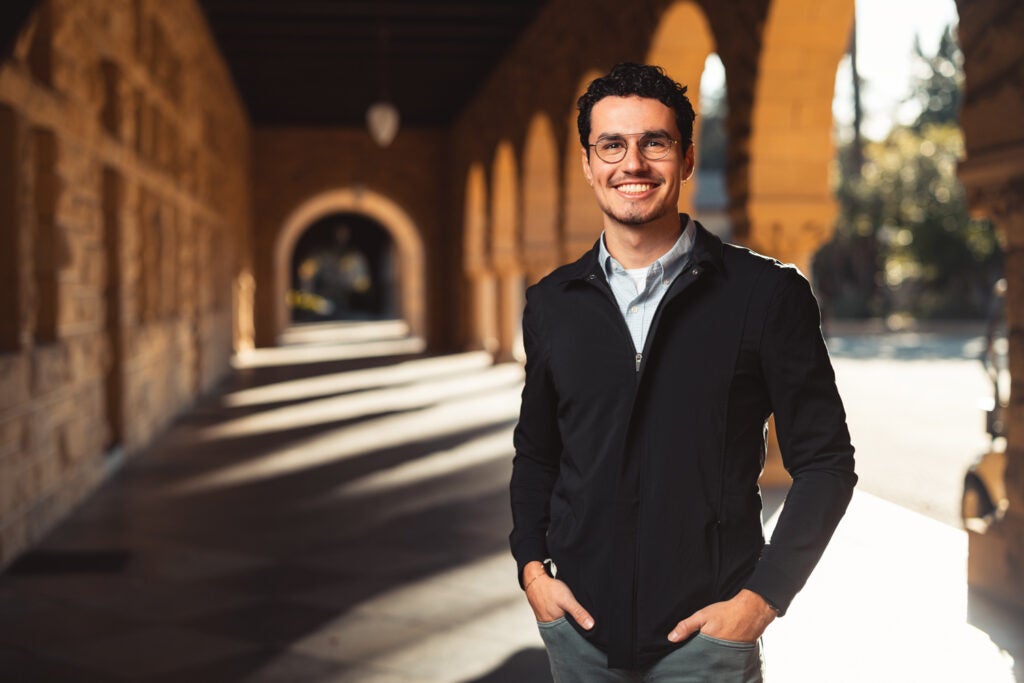How Stanford’s Why College course took one student on an unexpected journey
After taking the undergraduate class, Why College, Daniel Gaughran took a leave of absence from Stanford to extend the course’s goals of contemplation and self-discovery. He is now back at Stanford, energized and ready for whatever is next.
Daniel Gaughran began his freshman year at Stanford in much the same way that he finished his senior year of high school: inside his childhood home in Seattle, Washington.
It was the fall of 2020, and the world was reeling from the COVID-19 pandemic. Much was still unknown about the then-called “novel coronavirus” and like many college students that year, Gaughran was sheltered in place with his parents. Throughout that period, academic milestones were low-key affairs, recognized for the most part at a distance, including his matriculation at Stanford: Convocation, which marks the beginning of the academic year, and new student orientation, was celebrated virtually.
That quarter, learning also took place remotely.
When Gaughran would have been sitting in a lecture hall like Cubberley Auditorium, he was at his family’s kitchen counter. The living room was the Green Library, the Quad, and Tresidder all in one.
Gaughran wondered if this was right for him.
The question was at the foundation of a seminar Gaughran was taking with Stanford professor Dan Edelstein. He was enrolled in Edelstein’s section of Why College? Your Education and the Good Life, an early iteration of the class all first-year students are now required to take as part of the university’s newly restructured undergraduate requirement program, Civic, Liberal, and Global Education (COLLEGE).
The course asks students to consider what they want out of their college experience and how their education can help them meaningfully engage with their peers and new perspectives. As Gaughran explained: “The Why College class is a way to think about how to spend time at Stanford: What’s the purpose of being here? What’s the purpose of being a student?”
Throughout the quarter, students examine these questions and others across a range of perspectives, from the contemporary – writers such as Jenny Odell and Zadie Smith – to the canonical – ancient philosophers including Plato and Seneca.
For Gaughran, the philosophy of the ancient Greek thinker, Epicurus (341-270 BC) would become particularly salient.
Gaughran learned how Epicurus had established a new school of philosophy on the outskirts of Athens called “the Garden.” The setting was unique for the period; Unlike other schools of the time such as Plato’s Academy or Aristotle’s Lyceum, Garden students – or as Epicurus called them, his “friends” – lived a very simple and virtuous life together, in community. Amidst the tranquility, in commune with nature and with no external distractions, Epicurus hoped they would cultivate deep connections and have meaningful discussions.
The immersive experience that Epicurus strove for in his pedagogical approach is not dissimilar to Stanford’s own residential model, Edelstein explained to students. Stanford students live together, and in its many gardens and courtyards across campus, heartfelt conversation and serious reflection can be had outside of the classroom.
For Epicurus, that was what life was really about.
“While many students think of college as a stepping stone to ‘real life’ – working 9 to 5, paying your taxes, worrying about the stock market – Epicurus would reply that, actually, the real life is what you will be experiencing here at college over the next four years,” Edelstein explained in a course lecture.
Gaughran realized that he wanted his education to emulate what Epicurus strove for in his garden, and he felt remote learning was not the right fit for him. Gaughran thus made the difficult decision to take a leave of absence.
“It was a leap of faith,” he recalled. “I had no idea what I was going to do, nothing was lined up.”
Applying lessons from Why College to life experiences
After putting his Stanford education on pause, Gaughran landed a job with a local real estate start-up. At 19 years old, he was their youngest employee. He also completed a summer internship with a global consulting firm. He found such professional experiences thrilling but also incredibly stressful at times. “I did everything you could possibly imagine that a 19-year-old shouldn’t be doing,” he recalled, adding: “I loved it.”

During his travels across Europe, Daniel Gaughran paused in the middle of the Spanish desert to capture the moment with a picture. (Image credit: Courtesy Daniel Gaughran)
At night, Gaughran also took college courses in calculus and physics at a community college nearby, Bellevue College.
But when Europe eased some of their COVID-19-related travel restrictions, Gaughran saw a new world of possibilities open up. His gap year became two.
With savings from his year of working, Gaughran embarked on a two-month backpacking trip across Europe, first traveling along the Amalfi coast in Italy, then onto the French Alps and Pyrenees mountain ranges, and eventually in northern Spain on the Camino de Santiago, where Gaughran set out on a 500-mile pilgrimage from southern France to the cathedral of Santiago de Compostela, where the remains of the apostle St. James is buried.
Even though Gaughran was nearly 6,000 miles away from both his Seattle home and the Stanford campus, some of the lessons he learned during his Why College course stayed close.
While backpacking, he found himself living the simple lifestyle Epicurus touted. Subsisting on just the bare necessities, and away from unnecessary distractions, his mind was cleared for contemplation.
“My favorite time was spent thinking completely alone in my thoughts for hours, days, weeks, upon end trying to clarify who I want to be as a person and the previous mistakes that I’ve made and why did I make those mistakes, how can I learn from them, and go forward into a new life,” Gaughran said.
Here too, Gaughran credited a simple but powerful assignment from his Why College curriculum that catalyzed his self-reflection journey.
For one class assignment, Edelstein – and now, other professors teaching the course – ask students to go outside, alone for 10 minutes with just a piece of paper, pencil, and their thoughts. Electronic devices, and the demands of social and digital media associated with them, are left behind. Students are encouraged to redirect their attention to their surroundings instead, and to look and listen at what is going around them.
The assignment is inspired by Jenny Odell’s manifesto, How to Do Nothing: Resisting the Attention Economy (Melville House, 2019). Odell argues that fully immersing oneself in one’s environment and community can have powerful effects on one’s own understanding of self and place in the world.
The idea behind it, as Edelstein explained, is that “The more we become attuned to the outside, the more we become attuned and inwardly aware as well.”
Gaughran said he had never experienced solitude like this before.
“[The exercise] was my first experience of really being alone in thought,” Gaughran said. “I’d never really intentionally put myself outdoors.”
Gaughran was then inspired to go on rambles around his neighborhood – again, without his phone or any music to distract him. Those one-hour walks turned into day-long hikes and overnight camping trips in the wilderness of the Pacific Northwest – experiences that eventually led him on a months-long trek across Europe. Deep contemplation was his guidebook.
“You’re in this incredible state of creative freedom,” Gaughran described. “All these thoughts flow in and out of your mind that sparked something I really liked.”
This too is also an objective of the course, Edelstein noted. “In many respects, the goal of the class is to have the students develop a sense of true introspection and find out who they are authentically. How can they break free from the scripts that others have written for them? And how can they really take control of their own lives?”
Gaughran said he spent a lot of time thinking about those questions during his travels. It allowed him to re-think some of the negative thought patterns he had developed about himself and the path he had chosen. He began to make peace with the past and work through his anxieties around college, work, and adulthood.
The Why College program is about rethinking some of those subjects. “Now I have a different perspective on what is important, and how I should be spending my time,” Gaughran said.
Gaughran also thinks the Why College class helped him be more open to befriending strangers while backpacking.
“Why College is all about sampling new things,” Gaughran said. “It pushes you to pursue people who know things that you don’t, to ask them questions, and to find answers that you don’t know anything about and to step outside your comfort zone.”
‘Running in the opposite direction’
Now back at Stanford, Gaughran laughs about the literal approach he took to Why College.
“I kind of joke about this,” he said. “The joke is: ‘I went to Stanford for one quarter, I took this Why College class where I asked myself every day, why am I going to college,’ and I dropped out for two years.”
He’s also appreciative of Stanford for giving him the time and space to take care of himself and his needs.
Gaughran is on track to graduate in 2024 and is undecided on what his major will be. He was once determined to be a computer scientist, but he is now taking classes in philosophy, political science, literature, and other topics that spark his curiosity. He said he spends a lot of time thinking about the meaning of his college education.
“I’ve always followed what everyone else is doing,” he said. “Now, I’m running in the opposite direction, and I find that the most rewarding, the most fun.”
Meanwhile, Gaughran is busy planning his next adventure. Next year, he has a permit to hike the Pacific Crest Trail, a path that stretches some 2,653 miles across the Cascade and Sierra Nevada mountain ranges.
This story is part of an ongoing, in-depth series by Stanford Report exploring the COLLEGE program.
